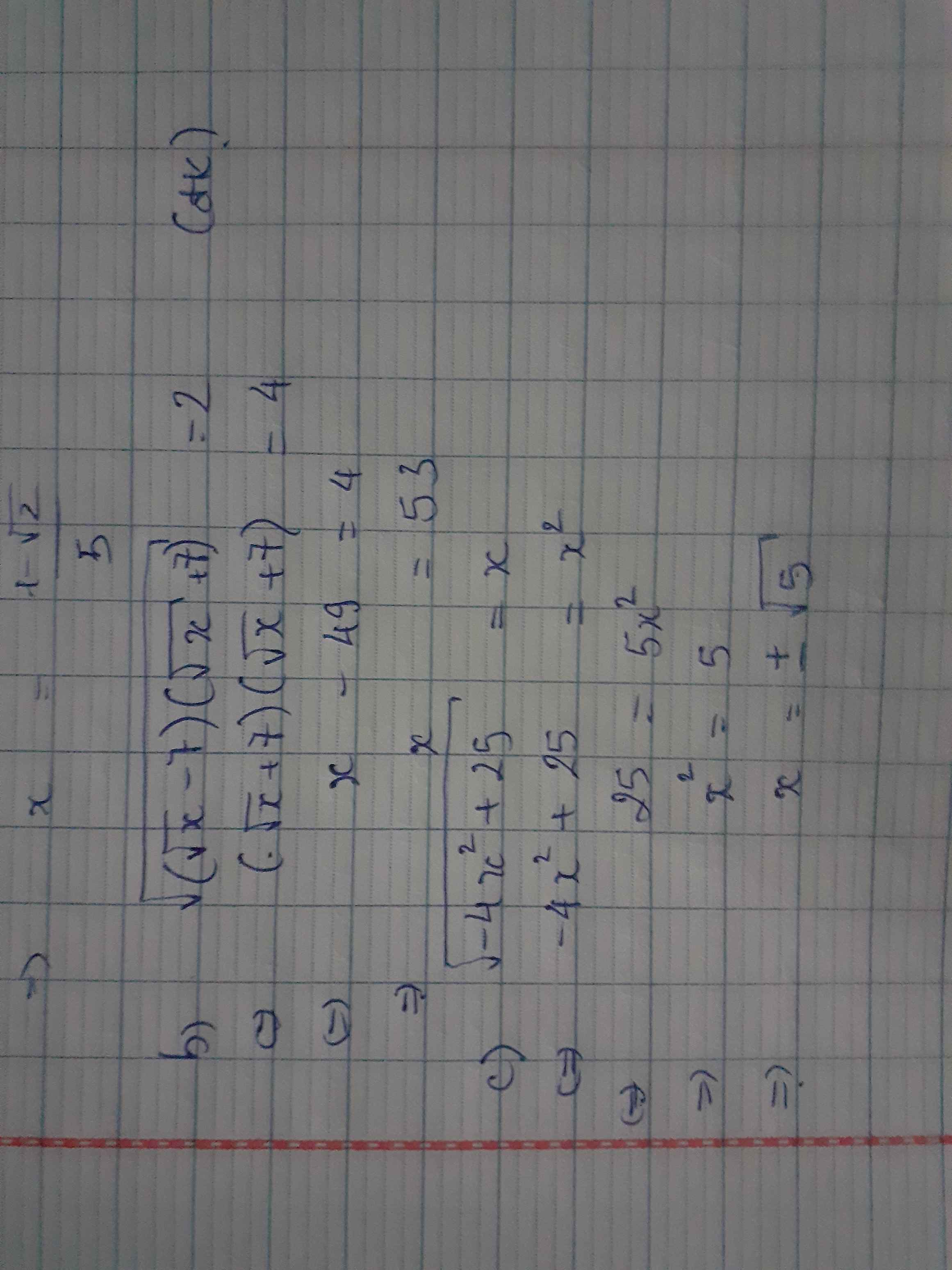Giải phương trình : (x + 2)2 - \(\sqrt{x^2+4x-1}\) = 7

Những câu hỏi liên quan
Giải phương trình:
1. \(5x^2+2x+10=7\sqrt{x^4+4}\)
2. \(\dfrac{4}{x}+\sqrt{x-\dfrac{1}{x}}=x+\sqrt{2x-\dfrac{5}{x}}\)
3. \(\sqrt{x^2+2x}=\sqrt{3x^2+4x+1}-\sqrt{3x^2+4x+1}\)
Giải phương trình sau:
1, \(\sqrt{5x+3}\) = \(\sqrt{3-\sqrt{2}}\)
2, \(\sqrt{\left(\sqrt{x}-7\right)\left(\sqrt{x}+7\right)}\) = 2
3,\(\sqrt{-4x^2+25}=x\)
1. ĐKXĐ: $x\geq \frac{-3}{5}$
PT $\Leftrightarrow 5x+3=3-\sqrt{2}$
$\Leftrightarrow x=\frac{-\sqrt{2}}{5}$
Đúng 1
Bình luận (0)
2. ĐKXĐ: $x\geq \sqrt{7}$
PT $\Leftrightarrow (\sqrt{x}-7)(\sqrt{x}+7)=4$
$\Leftrightarrow x-49=4$
$\Leftrightarrow x=53$ (thỏa mãn)
Đúng 2
Bình luận (0)
Xem thêm câu trả lời
2: Giải phương trình a) 2sqrt(25(x - 3)) - 1/2 * sqrt(4x - 12) + 1/7 * sqrt(49(x - 3)) = 20 b) sqrt(x ^ 2 - 6x + 9) = 2
a: \(\Leftrightarrow2\cdot5\sqrt{x-3}-\dfrac{1}{2}\cdot2\sqrt{x-3}+\dfrac{1}{7}\cdot7\sqrt{x-3}=20\)
=>\(10\cdot\sqrt{x-3}=20\)
=>\(\sqrt{x-3}=2\)
=>x-3=4
=>x=7
b: =>|x-3|=2
=>x-3=2 hoặc x-3=-2
=>x=5 hoặcx=1
Đúng 1
Bình luận (0)
Giải phương trình
\(\sqrt{x^{\text{2}}-4x+13}-x^{\text{2}}=7-4x\)
\(\Leftrightarrow x^2-4x+13-\sqrt{x^2-4x+13}-6=0\)
Đặt \(\sqrt{x^2-4x+13}=t>0\)
\(\Rightarrow t^2-t-6=0\Rightarrow\left[{}\begin{matrix}t=3\\t=-2< 0\left(loại\right)\end{matrix}\right.\)
\(\Rightarrow\sqrt{x^2-4x+13}=3\)
\(\Leftrightarrow x^2-4x+13=9\)
\(\Leftrightarrow x^2-4x+4=0\Rightarrow x=2\)
Đúng 1
Bình luận (0)
Giải các phương trình sau:
a) \(\sqrt {11{x^2} - 14x - 12} = \sqrt {3{x^2} + 4x - 7} \)
b) \(\sqrt {{x^2} + x - 42} = \sqrt {2x - 30} \)
c) \(2\sqrt {{x^2} - x - 1} = \sqrt {{x^2} + 2x + 5} \)
d) \(3\sqrt {{x^2} + x - 1} - \sqrt {7{x^2} + 2x - 5} = 0\)
a) \(\sqrt {11{x^2} - 14x - 12} = \sqrt {3{x^2} + 4x - 7} \)
\(\begin{array}{l} \Rightarrow 11{x^2} - 14x - 12 = 3{x^2} + 4x - 7\\ \Rightarrow 8{x^2} - 18x - 5 = 0\end{array}\)
\( \Rightarrow x = - \frac{1}{4}\) và \(x = \frac{5}{2}\)
Thay nghiệm vừa tìm được vào phương trình \(\sqrt {11{x^2} - 14x - 12} = \sqrt {3{x^2} + 4x - 7} \) ta thấy chỉ có nghiệm \(x = \frac{5}{2}\) thảo mãn phương trình
Vậy nhiệm của phương trình đã cho là \(x = \frac{5}{2}\)
b) \(\sqrt {{x^2} + x - 42} = \sqrt {2x - 30} \)
\(\begin{array}{l} \Rightarrow {x^2} + x - 42 = 2x - 3\\ \Rightarrow {x^2} - x - 12 = 0\end{array}\)
\( \Rightarrow x = - 3\) và \(x = 4\)
Thay vào phương trình \(\sqrt {{x^2} + x - 42} = \sqrt {2x - 30} \) ta thấy không có nghiệm nào thỏa mãn
Vậy phương trình đã cho vô nghiệm
c) \(2\sqrt {{x^2} - x - 1} = \sqrt {{x^2} + 2x + 5} \)
\(\begin{array}{l} \Rightarrow 4.\left( {{x^2} - x - 1} \right) = {x^2} + 2x + 5\\ \Rightarrow 3{x^2} - 6x - 9 = 0\end{array}\)
\( \Rightarrow x = - 1\) và \(x = 3\)
Thay hai nghiệm trên vào phương trình \(2\sqrt {{x^2} - x - 1} = \sqrt {{x^2} + 2x + 5} \) ta thấy cả hai nghiệm đếu thỏa mãn phương trình
Vậy nghiệm của phương trình \(2\sqrt {{x^2} - x - 1} = \sqrt {{x^2} + 2x + 5} \) là \(x = - 1\) và \(x = 3\)
d) \(3\sqrt {{x^2} + x - 1} - \sqrt {7{x^2} + 2x - 5} = 0\)
\(\begin{array}{l} \Rightarrow 3\sqrt {{x^2} + x - 1} = \sqrt {7{x^2} + 2x - 5} \\ \Rightarrow 9.\left( {{x^2} + x - 1} \right) = 7{x^2} + 2x - 5\\ \Rightarrow 2{x^2} + 7x - 4 = 0\end{array}\)
\( \Rightarrow x = - 4\) và \(x = \frac{1}{2}\)
Thay hai nghiệm trên vào phương trình \(3\sqrt {{x^2} + x - 1} - \sqrt {7{x^2} + 2x - 5} = 0\) ta thấy chỉ có nghiệm \(x = - 4\) thỏa mãn phương trình
Vậy nghiệm của phương trình trên là \(x = - 4\)
Đúng 0
Bình luận (0)
Giải phương trình
a) \(5x-7=|4x-2|\)
b) \(\sqrt{x+11}=1-x\)
b: \(\Leftrightarrow\left\{{}\begin{matrix}x^2-2x+1-x-11=0\\x< =1\end{matrix}\right.\Leftrightarrow x=-2\)
Đúng 0
Bình luận (0)
Giải phương trình:
\(x^2+4x+7=\left(x+4\right)\sqrt{x^2+7}\)
ĐKXĐ: mọi \(x\)
Ta có \(x^2+4x+7=\left(x+4\right)\sqrt{x^2+7}\)
\(\Leftrightarrow\left(x+4\right)\sqrt{x^2+7}-x^2-4x-7=0\)
\(\Leftrightarrow\left(x+4\right)\left(\sqrt{x^2+7}-4\right)-x^2-4x+4x-7+16=0\) ( thêm bớt )
\(\Leftrightarrow\left(x+4\right)\left(\sqrt{x^2+7}-4\right)-\left(x^2-9\right)=0\)
\(\Leftrightarrow\left(x+4\right)\dfrac{x^2-9}{\sqrt{x^2+7}+4}-\left(x^2-9\right)=0\)
\(\Leftrightarrow\left(x^2-9\right)\left(\dfrac{x+4}{\sqrt{x^2+7}+4}-1\right)=0\)
\(\Leftrightarrow\left[{}\begin{matrix}x^2-9=0\\\dfrac{x+4}{\sqrt{x^2+7}+4}-1=0\end{matrix}\right.\) \(\Leftrightarrow\left[{}\begin{matrix}x=\pm3\\\dfrac{x+4}{\sqrt{x^2+7}+4}=1\left(\text{*}\right)\end{matrix}\right.\)
Giải (*), ta được phương trình
\(\left(\text{*}\right)\Leftrightarrow x+4=\sqrt{x^2+7}+4\)
\(\Leftrightarrow\sqrt{x^2+7}=x\)
\(\Leftrightarrow x^2+7=x^2\)
\(\Leftrightarrow7=0\) ( vô lý )
Suy ra phương trình (*) vô nghiệm
Vậy \(S=\left\{\pm3\right\}\)
Đúng 0
Bình luận (0)
1.Giải phương trình:
\(\sqrt{x^2-4}-x^2+4=0\)
2.Giải phương trình:
\(\sqrt{x^2-4x+5}+\sqrt{x^2-4x+8}+\sqrt{x^2-4x+9}=3+\sqrt{5}\)
1. \(\sqrt{x^2-4}-x^2+4=0\)( ĐK: \(\orbr{\begin{cases}x\ge2\\x\le-2\end{cases}}\))
\(\Leftrightarrow\sqrt{x^2-4}=x^2-4\)
\(\Leftrightarrow\left(x^2-4\right)^2=x^2-4\)
\(\Leftrightarrow\left(x^2-4\right)^2-\left(x^2-4\right)=0\)
\(\Leftrightarrow\left(x^2-4\right)\left(x^2-4-1\right)=0\)
\(\Leftrightarrow\orbr{\begin{cases}x^2=4\\x^2=5\end{cases}}\)
\(\Leftrightarrow\orbr{\begin{cases}x=\pm2\left(tm\right)\\x=\pm\sqrt{5}\left(tm\right)\end{cases}}\)
Vậy pt có tập no \(S=\left\{2;-2;\sqrt{5};-\sqrt{5}\right\}\)
2. \(\sqrt{x^2-4x+5}+\sqrt{x^2-4x+8}+\sqrt{x^2-4x+9}=3+\sqrt{5}\)ĐK: \(\hept{\begin{cases}x^2-4x+5\ge0\\x^2-4x+8\ge0\\x^2-4x+9\ge0\end{cases}}\)
\(\Leftrightarrow\sqrt{x^2-4x+5}-1+\sqrt{x^2-4x+8}-2+\sqrt{x^2-4x+9}-\sqrt{5}=0\)
\(\Leftrightarrow\frac{x^2-4x+4}{\sqrt{x^2-4x+5}+1}+\frac{x^2-4x+4}{\sqrt{x^2-4x+8}+2}+\frac{x^2-4x+4}{\sqrt{x^2-4x+9}+\sqrt{5}}=0\)
\(\Leftrightarrow\left(x-2\right)^2\left(\frac{1}{\sqrt{x^2-4x+5}+1}+\frac{1}{\sqrt{x^2-4x+8}+2}+\frac{1}{\sqrt{x^2}-4x+9+\sqrt{5}}\right)=0\)
Từ Đk đề bài \(\Rightarrow\frac{1}{\sqrt{x^2-4x+5}+1}+\frac{1}{\sqrt{x^2-4x+8}+2}+\frac{1}{\sqrt{x^2}-4x+9+\sqrt{5}}>0\)
\(\Rightarrow\left(x-2\right)^2=0\)
\(\Leftrightarrow x=2\left(tm\right)\)
Vậy pt có no x=2
Giải phương trình:
a) \(\sqrt{x-2+\sqrt{2x-5}}+\sqrt{x+2+3\sqrt{2x-5}}=7\sqrt{2}\).
b) \(x^2-4x=\sqrt{x+2}\), với \(x\ge2\).
c) \(x^2-7x+2\left(x-2\right)\sqrt{x+1}+1=0\).
a:
ĐKXĐ: x>=5/2
\(\sqrt{x-2+\sqrt{2x-5}}+\sqrt{x+2+3\sqrt{2x-5}}=7\sqrt{2}\)
=>\(\sqrt{2x-4+2\sqrt{2x-5}}+\sqrt{2x+4+6\cdot\sqrt{2x-5}}=14\)
=>\(\sqrt{\left(\sqrt{2x-5}+1\right)^2}+\sqrt{\left(\sqrt{2x-5}+3\right)^2}=14\)
=>\(\sqrt{2x-5}+1+\sqrt{2x-5}+3=14\)
=>\(2\sqrt{2x-5}+4=14\)
=>\(\sqrt{2x-5}=5\)
=>2x-5=25
=>2x=30
=>x=15
b: \(x^2-4x=\sqrt{x+2}\)
=>\(x+2=\left(x^2-4x\right)^2\) và x^2-4x>=0
=>x^4-8x^3+16x^2-x-2=0 và x^2-4x>=0
=>(x^2-5x+2)(x^2-3x-1)=0 và x^2-4x>=0
=>\(\left[{}\begin{matrix}x=\dfrac{5+\sqrt{17}}{2}\\x=\dfrac{3-\sqrt{13}}{2}\end{matrix}\right.\)
Đúng 0
Bình luận (0)
giải phương trình: \(\left(2\sqrt{x+2}-\sqrt{4x+1}\right)\left(2x+3+\sqrt{4x^2+9x+2}\right)=7\)
Đk: \(x\ge2\)
pt <=> \(\frac{4\left(x+2\right)-\left(4x+1\right)}{2\sqrt{x+2}+\sqrt{4x+1}}\left(2x+3+\sqrt{4x^2+9x+2}\right)=7\)
<=> \(\frac{7}{2\sqrt{x+2}+\sqrt{4x+1}}\left(2x+3+\sqrt{4x^2+9x+2}\right)=7\)
<=> \(2x+3+\sqrt{4x^2+9x+2}=2\sqrt{x+2}+\sqrt{4x+1}\)(1)
Đặt : \(t=2\sqrt{x+2}+\sqrt{4x+1}\ge0\)
Ta có: \(t^2=8x+9+4\sqrt{4x^2+9x+2}\)<=> \(2x+3+\sqrt{4x^2+9x+2}=\frac{t^2+3}{4}\)
Phương trình (1) trở thành: \(\frac{t^2+3}{4}=t\Leftrightarrow t^2-4t+3=0\Leftrightarrow\orbr{\begin{cases}t=3\\t=1\end{cases}\left(tm\right)}\)
+) Với t = 1. Ta có:
\(2\sqrt{x+2}+\sqrt{4x+1}=1\)
<=> \(8x+9+4\sqrt{4x^2+9x+2}=1\)
<=> \(\sqrt{4x^2+9x+2}=-2-2x\)
<=> \(\hept{\begin{cases}-2-2x\ge0\\4x^2+9x+2=4x^2+8x+4\end{cases}\Leftrightarrow}\hept{\begin{cases}x\le-1\\x=2\end{cases}}\)loại
+) Với t = 3. Ta có:
\(2\sqrt{x+2}+\sqrt{4x+1}=3\)
<=> \(8x+9+4\sqrt{4x^2+9x+2}=9\)
<=> \(\sqrt{4x^2+9x+2}=-2x\)
<=> \(\hept{\begin{cases}-2x\ge0\\4x^2+9x+2=4x^2\end{cases}\Leftrightarrow}\hept{\begin{cases}x\le0\\9x+2=0\end{cases}}\Leftrightarrow x=-\frac{2}{9}\left(tmdk\right)\)
Vây:...
Đúng 0
Bình luận (0)
ĐK \(x\ge\frac{-1}{4}\)
Với điều kiện đó ta có \(2\sqrt{x+2}+\sqrt{4x+1}>0\)
Biến đổi phương trình đã cho trở thành
\(7\left(2x+3+\sqrt{4x^2+9x+2}\right)7\left(2\sqrt{x+2}+\sqrt{4x+1}\right)\)
\(\Leftrightarrow2x+3+\sqrt{4x^2+9x+2}=2\sqrt{x+2}+\sqrt{4x+1}\left(1\right)\)
Đặt \(t=2\sqrt{x+2}+\sqrt{4x+1}\left(t\ge\sqrt{7}\right)\)
\(t^2=8x+9+4\sqrt{4x^2+9x+2}\Rightarrow2x+\sqrt{4x^2+9x+2}=\frac{t^2-9}{4}\)
Thay vào (1) ta được \(t^2-4t+3=0\Leftrightarrow\orbr{\begin{cases}t=1\left(ktm\right)\\t=3\left(tm\right)\end{cases}}\)
Với t=3 ta có:\(2\sqrt{x+2}+\sqrt{4x+1}=3\)giải ra ta được \(x=\frac{-2}{9}\left(tm\right)\)
Vậy pt có 1 nghiệm duy nhất \(x=-\frac{2}{9}\)




























